The Right to Speak for Ourselves
For far too long, Palestinians have been denied the freedom to tell our own story.
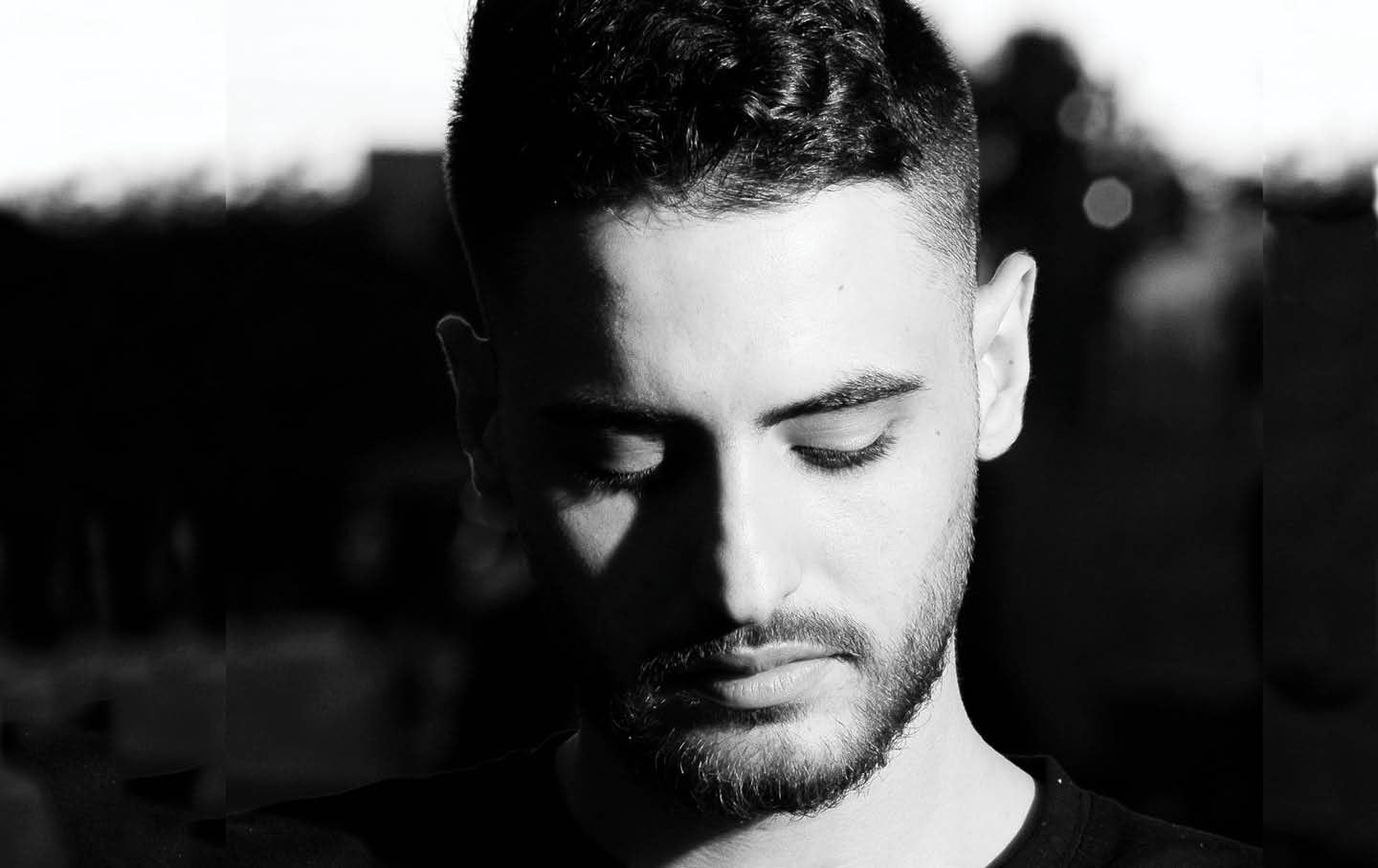
Today, I’m going to be talking to you about perfect victims and the politics of appeal. The Palestinian people, on television screens or more largely in the public sphere, exist in a false dichotomy: We are either victims or terrorists.
Those of us who are terrorists—or articulated to be terrorists—never get the opportunity to be commentators on those screens. They are almost mythical creatures, the stuff of scary stories: big bad wolves with furrowed eyebrows, sharp fangs, and terrifying political incorrectness. They roam the streets mumbling in aggressive Arabic, sometimes reading the Quran, wanting to loot and shoot everything in sight. They’re coming after you. Hide your wives, hide your planes, hide your human shields. Many in the audience have a mental image of who I’m talking about.
On the other hand, those of us who are victims, who are depicted in newspapers and documentaries as wounded, wailing, and weak, are sometimes given the microphone. But this mic comes at a steep price. There are prerequisites these victims must meet. They’re often women, children, the elderly. They carry US or European passports and perform humane professions or have disabilities. Everyone will tell you, “They would never hurt a fly.” And even if they were once wolves, they are now docile and defanged, only howling at the moon in agony. They never charge, attack, or hunt in a pack. Their campaigning is individualistic, centered only on their personal tragedies, incentivized by humanitarian need rather than political ideology.
Let me tell you a story. Last year on May 11, I, like many around the globe, woke up to the news that the beloved Palestinian TV reporter Shireen Abu Akleh had been shot and killed by the Israeli occupation forces during a raid in the Jenin refugee camp in the occupied West Bank. Within minutes of the news breaking, I found an anonymous e-mail in my inbox, with a tip. The e-mail read: “Very urgent and necessary, please announce on Twitter and Facebook that Shireen Abu Akleh is an American citizen. This is a fact, not a rumor. The Israelis killed an American journalist.” I, of course, did not announce it. And when I wrote about the killing of Shireen Abu Akleh, I made sure not to refer to her as an American citizen but rather as a holder of a US passport. But it didn’t matter. The news that Shireen was an American was out in the following hours, and her alleged Americanness suddenly made her human.
This anecdote is an opportunity to ask ourselves three questions: In the mainstream Western mind, who is considered mournable? Who is humanized? And who gets the mic?
Who Is Humanized?
Shireen Abu Akleh was a person because she was a person. But to the average American, she was a person because she was a woman, a Christian, an American, a journalist wearing a clearly marked press vest. She even had a dog. When we die, for us to make headlines or for our death to matter, we need to have died spectacular people or have endured a spectacularly violent death. And when I say “spectacularly violent,” I think about somebody like Mohammed Abu Khdeir, a 16-year-old boy who lived across the street from my public high school in Shufat, in occupied Jerusalem, who was kidnapped from in front of his house and burned to death by Israeli settlers.
What does it mean to practice a politics of appeal? For decades, well-meaning journalists and cultural workers used a humanizing framework in their representation of oppressed people in hopes of countering the traditional portrayal of the Palestinian as a terrorist. Not only did this produce a false, flattening dichotomy between terrorists and victims, but the victimhood that emerges within this framework is a perfect victimhood, an ethnocentric requirement for sympathy and solidarity.
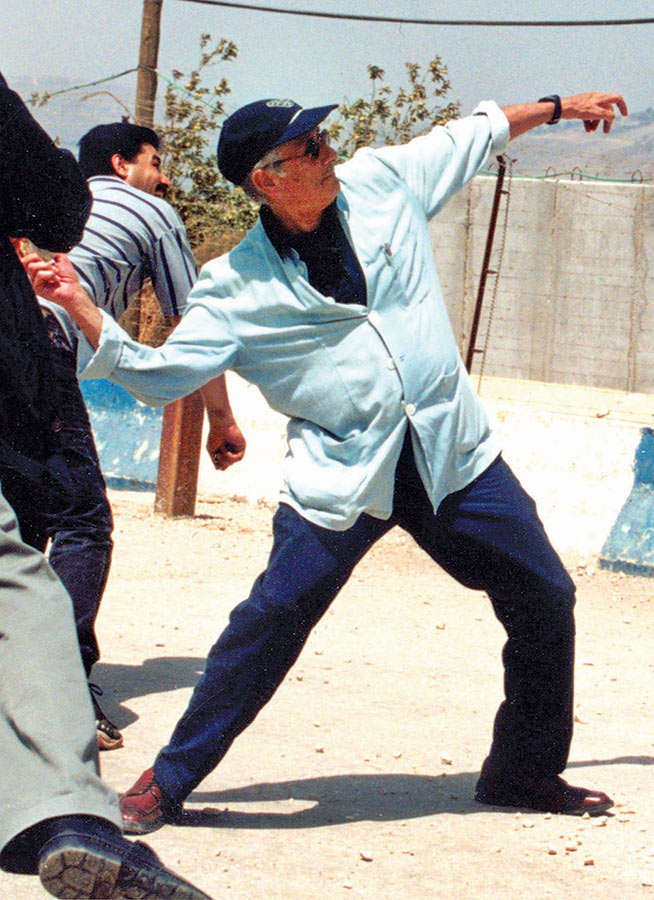
We often overemphasize an oppressed person’s nonviolence, noble profession, disabilities; we ring them with accolades. And we do this not only in the Palestinian context, but also with regard to Black American victims of police brutality: “They were artists” or “They were mentally ill” or “They were unarmed.” It’s as if condemning the state for sanctioning the death of a Black person is permissible only if the slain person is a sterile model of American citizenry. One could say the same about sexual assault victims: We must remind the listener that the victim was sober and dressed appropriately.
Now, obviously I’m not saying that people who engage in a politics of appeal should be burned at the stake. Lots of people do this in good faith. A lot of the time, they say it’s a strategy. When we say that Shireen Abu Akleh was American or that Alaa Abdel Fattah, the Egyptian political prisoner, is British, we say that there’s a strategy behind this. It’s going to make them more relatable to the American public; it’s going to make justice more attainable for them. But in fact, this only shrinks the scope of humanity for the rest of us and reinforces a hierarchy of suffering. It makes the requirement to become “human” a lot narrower and more difficult to attain. And such practices of what I’ll call “defanging” reproduce the mainstream cultural order in which Palestinians are robbed of their agency, their right to self-determination, and ultimately their permission to narrate, as the Palestinian scholar Edward Said once put it.
Who Can Be Mourned?
Here’s another perfect-victim situation: There were these two young men, brothers from Beit Rima, a village close to Ramallah in the occupied West Bank. One of them had a high-paying job at the Arab Islamic Bank, and the other was studying computer engineering at Birzeit University. They came from a comfortable family. When the Israeli army was raiding their village, which it illegally occupies, these brothers defended their community with stones and whatnot, and they got shot. They both got killed within minutes of each other. Jawad and Thafer Rimawi were their names.
Since then, their sister Ru’a Rimawi, who had been studying to become a doctor, a pediatrician, has operated in a field where she has virtually no prior experience: campaigning. She has been sharing eulogies and anecdotes about her brothers with her social media followers. “After each social media post,” she “breaks down,” she told me. She wants to keep their memory alive, especially as they exist within a framework where the Palestinians who are killed on a daily basis receive little to no media attention. “But it’s hard,” she told me, “to convince the world that your brothers’ lives mattered.” It’s not enough that they were killed—she must show that they had careers and they weren’t eager to throw themselves at death. “They had ambition and they had dreams, like anybody in the world.”
I have been following Ru’a for the past month as she has been trying to publish an opinion essay about her brothers. We pitched it to The Guardian, The Washington Post, the Los Angeles Times. We didn’t try The New York Times. All of them refused or ignored the article. When we talked to a media expert about this, he told us that her article was not getting published because her brothers threw stones at the army. Their victimhood was not a perfect victimhood, so they don’t get a spot in the LA Times.
Who Gets the Mic?
Usually, I prefer to focus my talks on reporting Zionist brutality rather than on addressing the challenges of representation, because these challenges inevitably pale in comparison with the repression and violence visited upon Palestinians on the ground. But that very violence is precisely why we should sometimes address these predicaments of representation that ensnare advocates of Palestinian liberation in the Western world.
In 1984, in response to the Israeli-Lebanese War, Edward Said published his essay “Permission to Narrate,” where he critiqued the Western media’s biased coverage of the war, which favored the Israeli narrative and suppressed the Palestinian viewpoint. Today we are in a very similar predicament. Israeli politicians and analysts go on TV to frame the so-called conflict, while only Palestinian victims get that opportunity—and even then, they aren’t interviewed as much as interrogated.
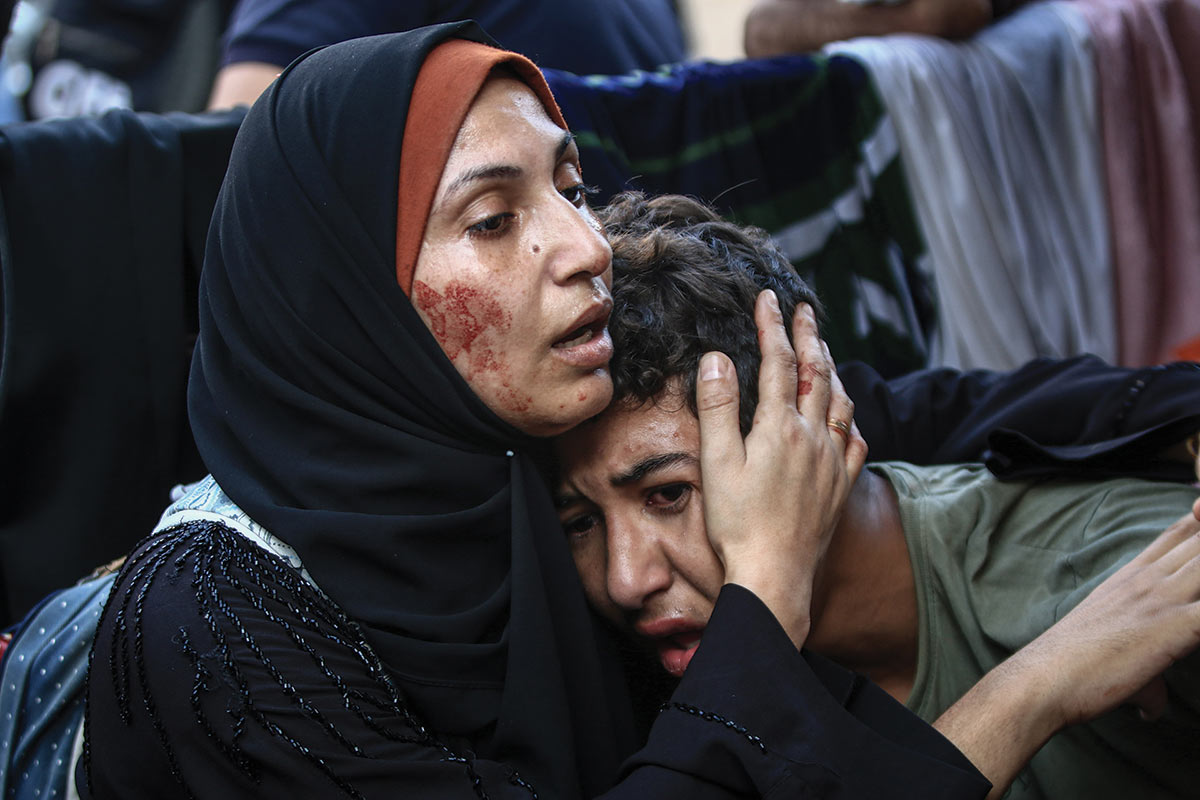
I’m in a unique position. I am, on the one hand, a victim who lost his house—or, well, whose home in Sheikh Jarrah was stolen by settlers. And on the other hand, I’m a journalist; I’m a writer. I occasionally get invited onto CNN—well, once; I never seem to get invited onto the same channel twice.
But I want to investigate why I’m sometimes given the mic. Is it because I’m easy on the eyes? Is it because I speak with an American accent? Maybe. I’ve been doing public advocacy for years, and sometimes I worry that it’s not because of my brain but rather that it’s a case of tokenization. When I was 11, I was in a documentary, and then I got flown out to the European Parliament and to the US Congress. And I remember, I went to a shop in Jerusalem and bought fake glasses to make myself look smart. I sat on the podium at the European Parliament and in Congress having no clue what the hell I was talking about. I thought, “Wow, they think I’m so mature and wise.” Years later, I realized this wasn’t the case.
Popular
“swipe left below to view more authors”Swipe →At the height of the 2021 Unity Uprising, I was contacted on behalf of the offices of various American senators and congresspeople, including Chuck Schumer, and I was asked—I’m quoting directly from the text—whether I can “provide [them] with a Palestinian child who will present their dream of what peace means?” To translate this request: The only Palestinian safe enough to sit at their tables is a child.
Western audiences, much like their politicians, are not willing to engage adult Palestinians, whose razor-sharp critiques would potentially offend them. Because of this, we burden our children with the responsibility of giving humans eyes for humanity. We send delegations of Palestinian kids to the Hill. We have them memorize PowerPoints about peace and coexistence, tell them to display images of their blood and severed limbs in the hope that this will change the minds of Americans who are heavily propagandized, if not themselves heavyweight propagandists.
I know this, again, firsthand, because I was doing this when I was really young. But even I am by no means a person who’s easy on the stomach. Look around—there are like 7,000 cops here. There were multiple articles, statements, and flyers protesting this lecture before it began. I’m dangerous, apparently.
So, if I can’t always get the mic, who can? Surely the person we’re honoring today, Edward Said, one of the most celebrated public intellectuals of our time, can get the mic. Well, even Edward Said—a person of his stature, of his acclaim—at one point in time did not get the mic. In 2000, Edward Said visited Lebanon. He threw, in his words, “a pebble” at an Israeli guardhouse at the border. Everybody got mad. Edward Said was no longer human. He could not speak their language anymore. The headline for a Columbia Daily Spectator article about him was: “Edward Said Accused of Stoning in South Lebanon.” The Freud Society of Vienna canceled a lecture by him. The Washington Post ran an article that opened by saying Said was “a little too portly, a little too distinguished to be hurling stones in the direction of Israeli soldiers…. Could it be that Edward Said…has joined the ranks of Palestinian stone throwers?” It’s a very damning article, but other people thought it was not damning enough. Two authors responded in the Daily Spectator: “The opening sentence disturbs us, as it appears to imply that the act of hurling stones across an international border at unknown civilians and soldiers of a neighboring country would be acceptable or at least understandable if undertaken by ordinary younger, less portly or distinguished individuals.” They called his act “a gratuitous act of random violence.”
So, if someone like Edward Said cannot always get the mic, which Palestinians have the right to narrate? Israelis! Every so often, an Israeli politician comes out and says it: “We’re gonna give you another Nakba, we’re gonna give you a genocide. We’re gonna send you packing to Jordan.” Or an Israeli soldier, who can’t sleep at night because he remembers the kids he killed, goes on a speaking tour around the United States. Or people cite Theodor Herzl, one of the pioneers of Zionism, who wrote in 1895: “We must expropriate gently the private property on the estates assigned to us. We shall try to spirit the penniless population across the border. Both the process of expropriation and the removal of the poor must be carried out discreetly and circumspectly.” Herzl also wrote: “The anti-Semites will become our most dependable friends, the anti-Semitic countries our allies.”
My favorite example of this comes from Ze’ev Jabotinsky, who cofounded the Irgun, the Zionist paramilitary responsible for the bombing of the King David Hotel in Jerusalem in 1946 and the Deir Yassin massacre in April 1948. He wrote that there is no “solitary instance of any colonization being carried on with the consent of the native population. The native populations have always stubbornly resisted the colonists, irrespective of whether they were civilized or savage.”
We—Palestinians and well-meaning activists and journalists—are obsessed with this. We salivate to quote these people. My grandparents have viscerally narrated the harrowing massacres upon which the Zionist state was built, but their testimonies were not enough. It takes the confessions of an ex-soldier or the belated miraculous epiphany of human rights organizations for the world to listen. Palestinians have been talking about apartheid for decades—we’re even past that now—but it took Human Rights Watch and Amnesty International and B’Tselem decades to finally confirm it.
Growing up, field workers and human rights researchers were constant guests in our house. I would show them pictures of my grandmother being beaten by settlers to try to make the case, as they’d eat maqluba from our table every Friday. And I would offer my analysis—“This is what I think is happening”—but they wouldn’t take it, as if to say, “I just want pictures of your bruises, a sample of your blood, and I’ll announce what’s happening later.”
Every now and then, Israeli politicians slip up, boasting about killing Arabs or promising Palestinians another Nakba. Sometimes a Zionist paper runs a headline confirming that “Israel is a settler-colony,” and we cite their words endlessly. But why do their words carry so much heft? Why do we give the authority of narration to those who have murdered and displaced us, when the scarcity of their guilty consciences means honesty is never guaranteed? Why do we wait for those carrying the batons to speak when our bruised bodies told the whole truth?
I know I am native to Jerusalem, not because Jabotinsky said so, but because I am. I know that Zionists have colonized Palestine without the need to cite Herzl. I know this because I live it, because the ruins of countless depopulated villages provide the material evidence of calculated ethnic cleansing. When we as Palestinians speak about this ongoing and ignored ethnic cleansing—which is inherent to Zionist ideology, by the way—we are at best passionate and at worst angry and hateful. But in reality, we are just reliable narrators. I say we are reliable narrators not because we’re Palestinians. It’s not on an identitarian basis that we must be given, or must take, the authority to narrate. But history tells us that those who have oppressed, who have monopolized and institutionalized violence, will not tell the truth, let alone hold themselves accountable.
The past few years have been quite interesting for Palestinians. We have been at the table, sometimes even somewhat steering the conversation. This marks an opportunity to change the rhetoric, to change the discourse, and to create a radical shift in the public sentiment about Palestine and Palestinians. It is up to us as cultural workers, as knowledge producers, as academics, as journalists, as activists, as social media commentators, to be brave. This is a time not to hide behind our fingers or behind qualifiers.
And for those of us who are journalists, it’s not even about being brave. It’s about doing our jobs. If our job is to report the truth, we must report the truth.
I want to touch on one more thing. When I go onstage, I usually joke a lot. I joke on purpose, first of all because I want to believe I’m funny. But there’s another reason: Any Palestinians operating in the public eye, especially Palestinians who have suffered Israeli violence, are expected to behave a certain way. You are supposed to be miserable—head bowed, wailing and weak and asking for mercy. You’re supposed to be polite in your suffering. And I completely refuse this. I refuse these politics of appeal. I don’t want to appeal to anyone. I can experience travesty and tragedy, and profound loss, and I can still make a joke about it. And that is the full spectrum of Palestinian humanity—or human humanity at large. We are human not just because we cry when we lose our mothers, or when we lose our homes, or because we have pets or hobbies. We are humans because we feel rage and we feel disdain—because we resist.
And I am honestly grateful for my disdain, because it reminds me that I am human. I am grateful for my rage, because it reminds me of my ability to react naturally to injustice. I am grateful for the opportunity to be flippant, to satirize and ridicule my impenetrable, indelible occupier. So, I invite you all to interrogate your biases as you leave this lecture, to interrogate what makes you want to qualify a Palestinian’s humanity. And I invite you, again, to be brave. Thank you so much.
Thank you for reading The Nation
We hope you enjoyed the story you just read, just one of the many incisive, deeply-reported articles we publish daily. Now more than ever, we need fearless journalism that shifts the needle on important issues, uncovers malfeasance and corruption, and uplifts voices and perspectives that often go unheard in mainstream media.
Throughout this critical election year and a time of media austerity and renewed campus activism and rising labor organizing, independent journalism that gets to the heart of the matter is more critical than ever before. Donate right now and help us hold the powerful accountable, shine a light on issues that would otherwise be swept under the rug, and build a more just and equitable future.
For nearly 160 years, The Nation has stood for truth, justice, and moral clarity. As a reader-supported publication, we are not beholden to the whims of advertisers or a corporate owner. But it does take financial resources to report on stories that may take weeks or months to properly investigate, thoroughly edit and fact-check articles, and get our stories into the hands of readers.
Donate today and stand with us for a better future. Thank you for being a supporter of independent journalism.
More from The Nation
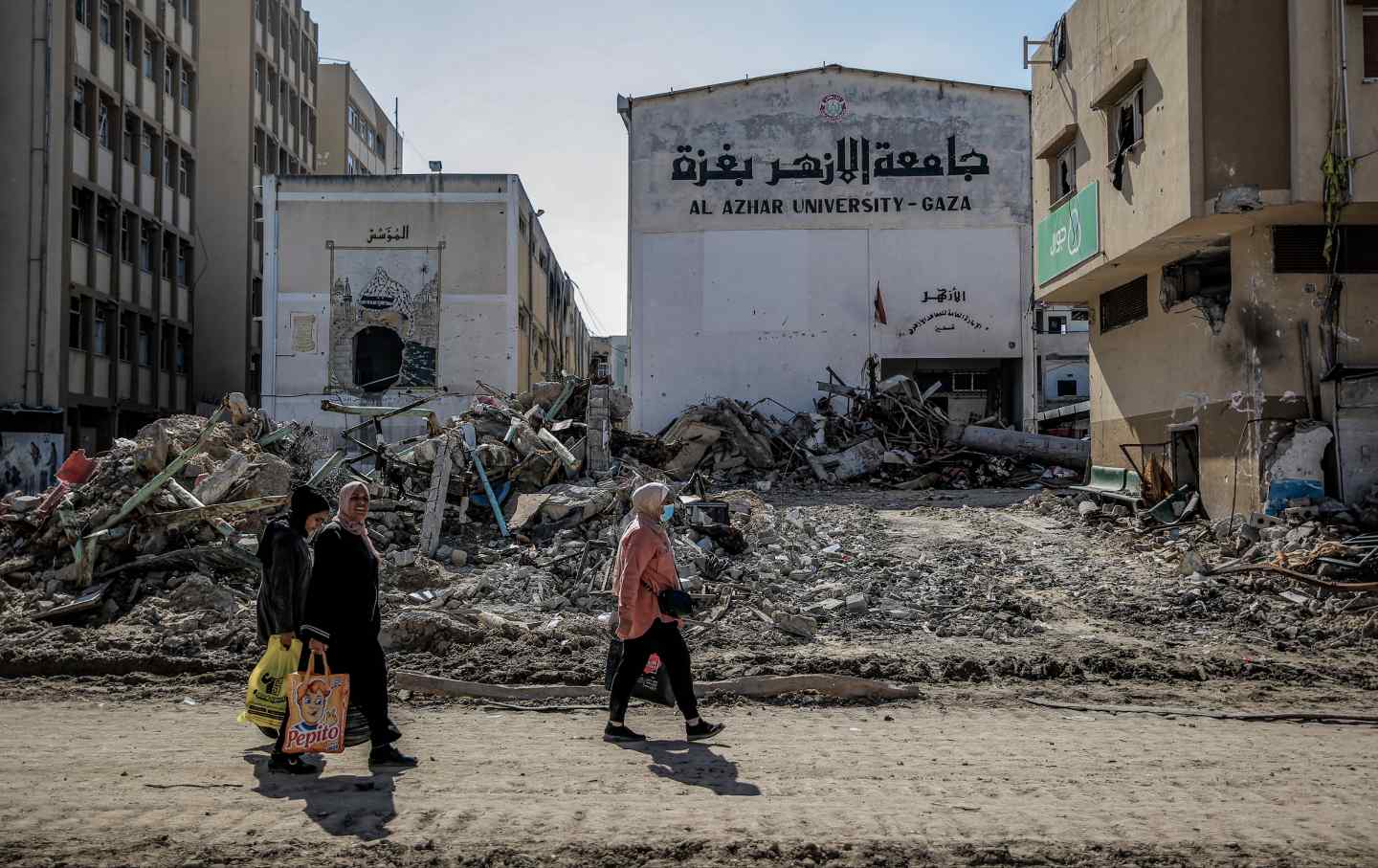
Every University in Gaza Has Been Destroyed. So Have These Students’ Dreams. Every University in Gaza Has Been Destroyed. So Have These Students’ Dreams.
The class of 2024 was supposed to graduate this year. Instead, they are trapped in the hell of Gaza, and their futures are unknown.
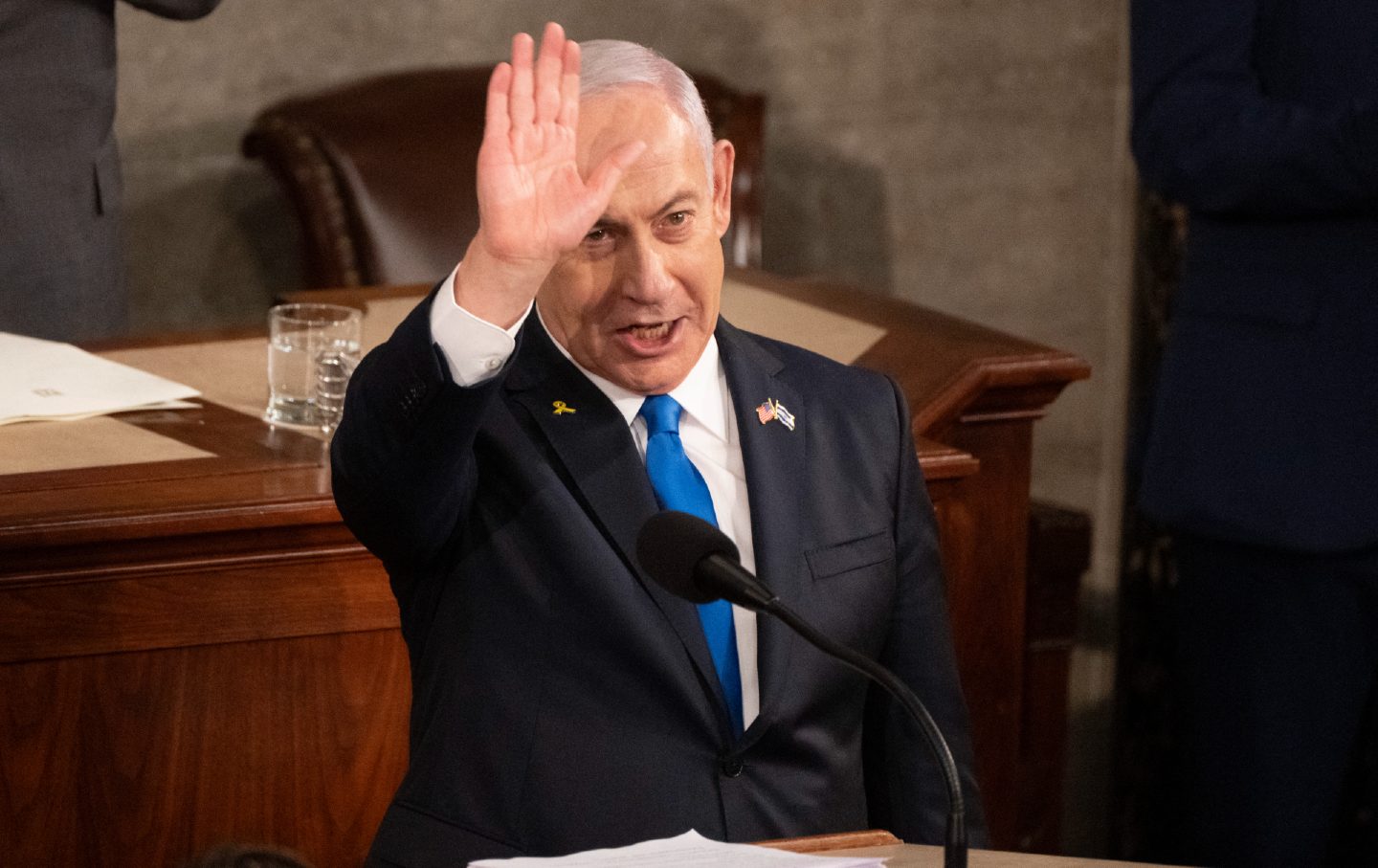
Netanyahu’s Theater of the Grotesque Netanyahu’s Theater of the Grotesque
Yesterday, Congress lauded and applauded the Israeli prime minister, who has been accused of war crimes by the ICC, even as his victims continued to die in Gaza.
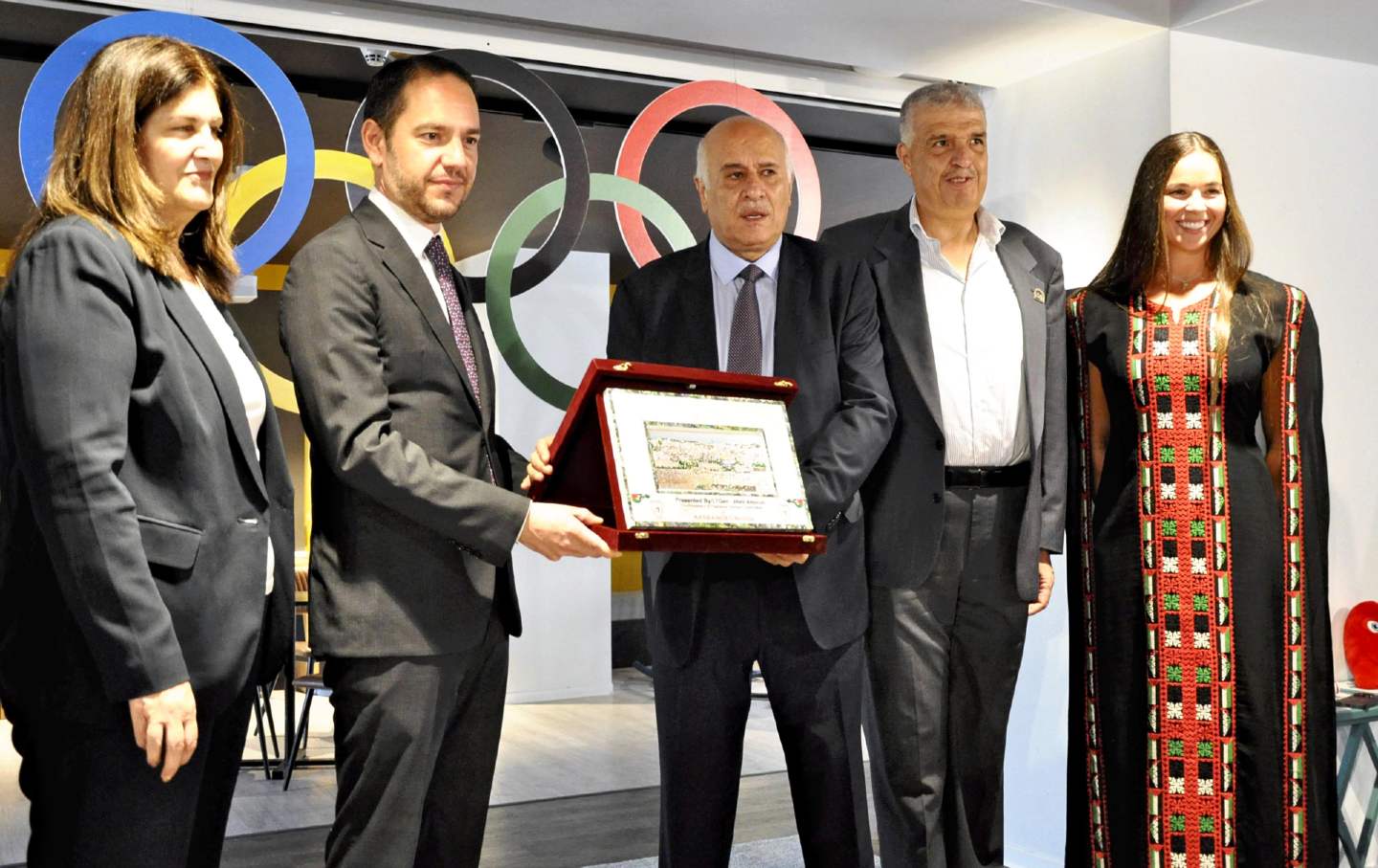
Palestinian Olympians Are Competing as Their World Burns Palestinian Olympians Are Competing as Their World Burns
Palestinian Olympians will make history in Paris, despite unfathomable conditions of genocide.
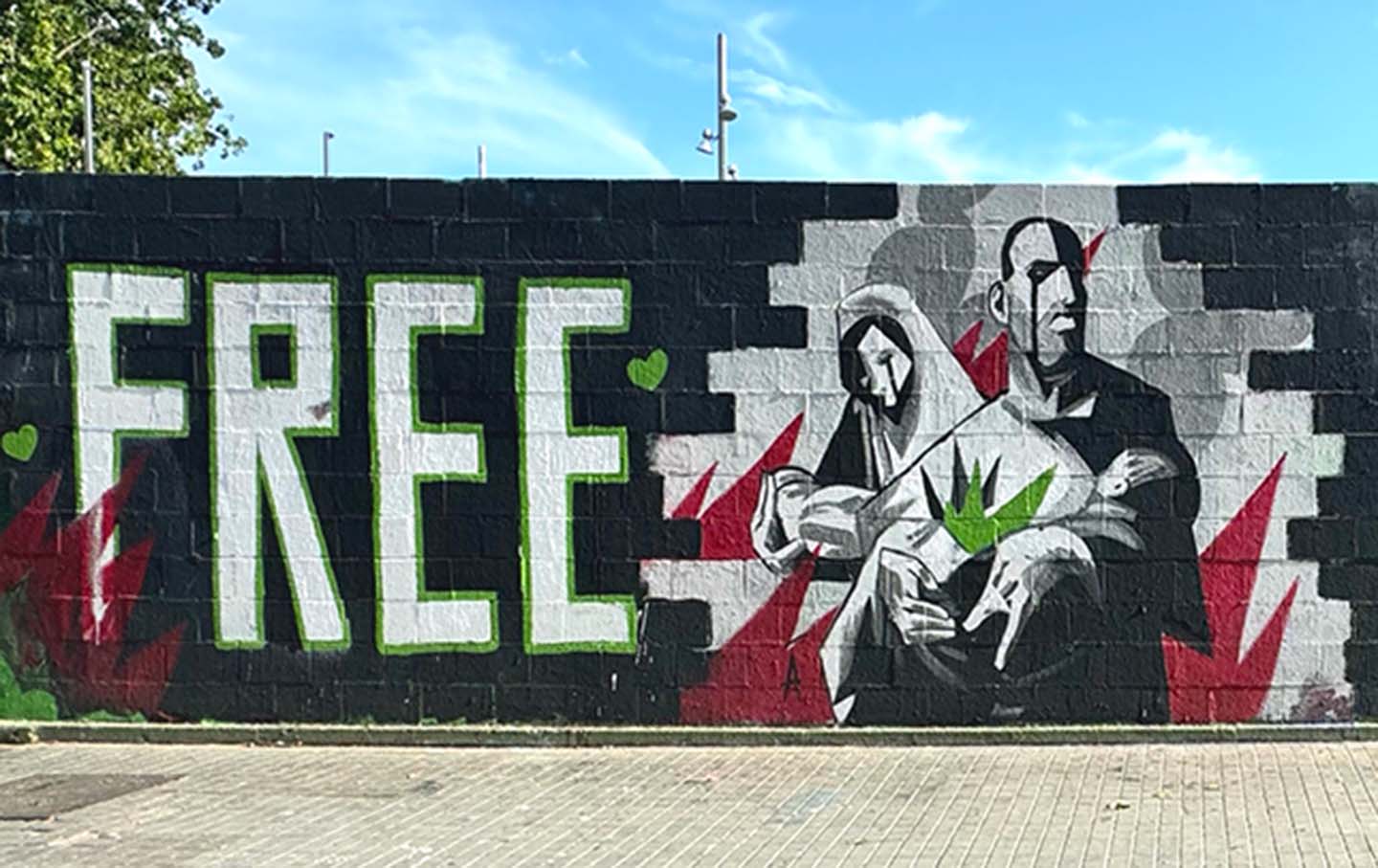
International Solidarity With Palestine International Solidarity With Palestine
Street mural, Barcelona, Catalunya, Spain.
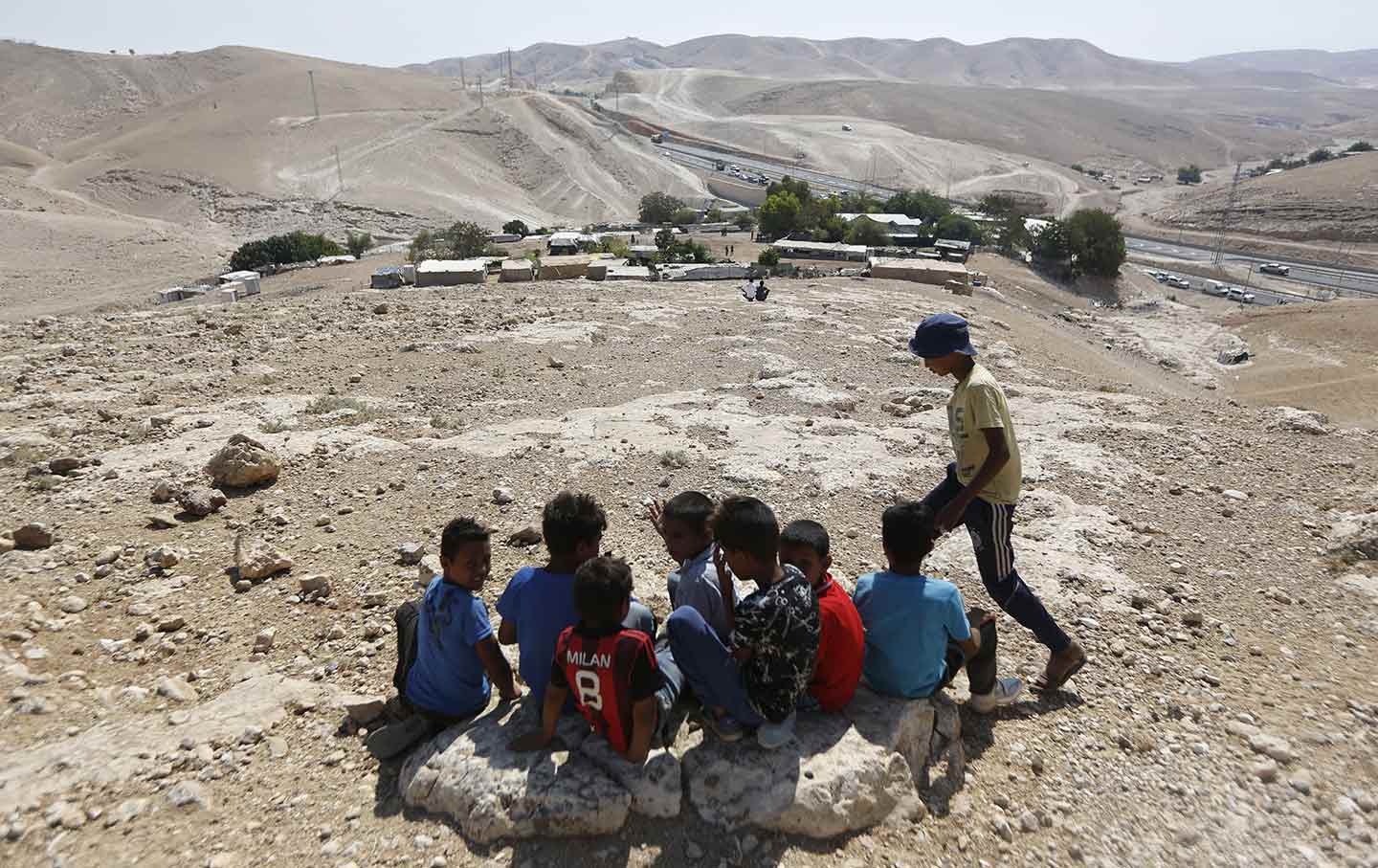
The Horror in Israel and Palestine Began Half a Century Ago The Horror in Israel and Palestine Began Half a Century Ago
From the very start, Jewish violence has accompanied the proliferation of settlements.
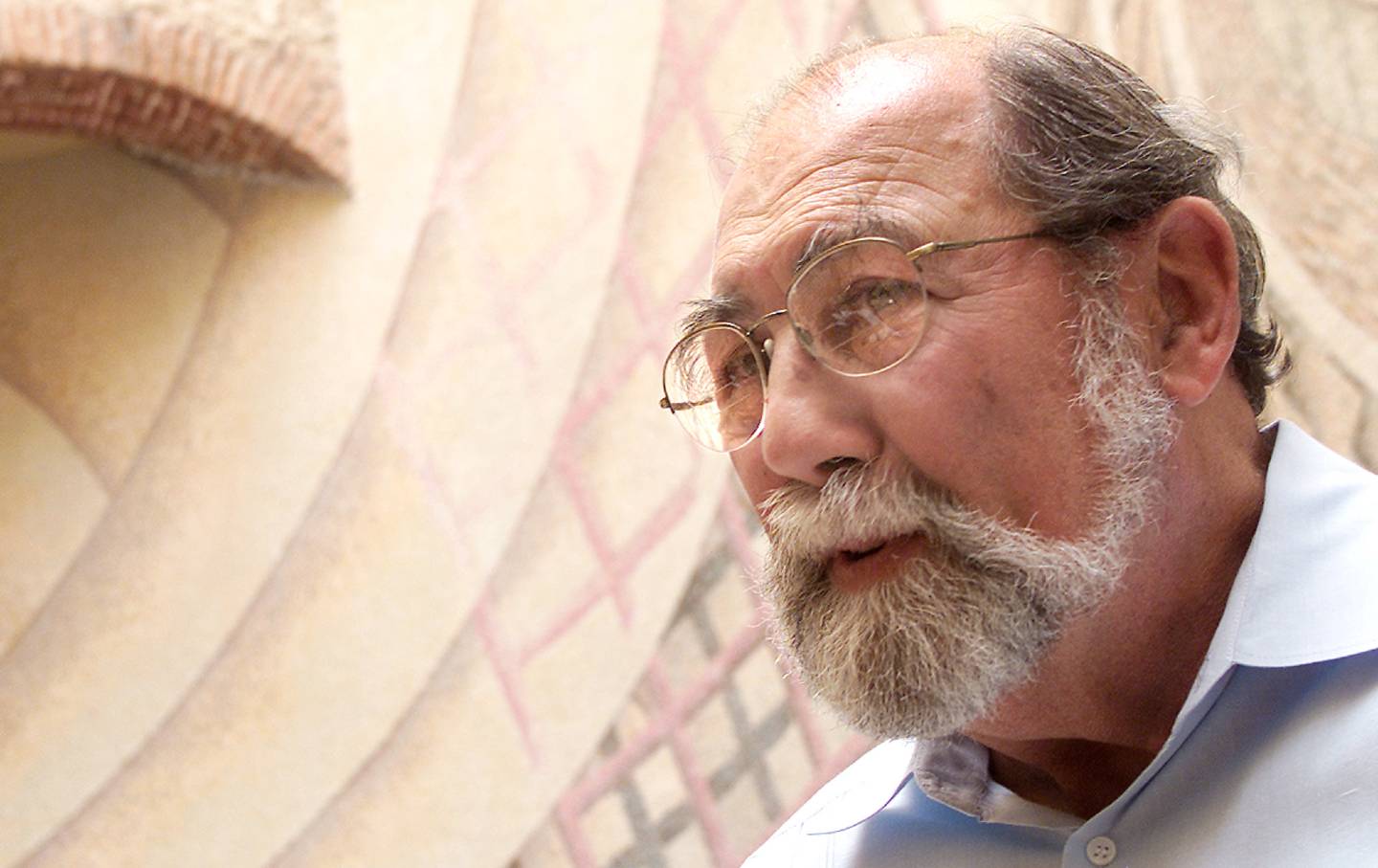
Wayne Smith Devoted His Career to Dialogue and Diplomacy Wayne Smith Devoted His Career to Dialogue and Diplomacy
The former Foreign Service officer liked to say “Cuba seems to have the same effect on American administrations as the full moon has on werewolves.”


